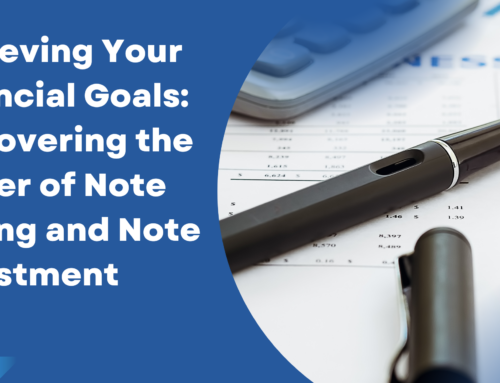Real estate offers numerous ways to build wealth, and one lesser-known approach is by becoming a lender.
What is a real estate note?
When someone borrows money to buy real estate, they create a promissory note. This note is essentially a written commitment to repay the loan, outlining the loan amount, interest rate, repayment schedule, and other critical terms. In some cases, these notes can also be referred to as mortgage notes for sale.
In the United States, a real estate note goes by various names, such as:
– Promissory note
– Mortgage note
– Borrowers note
– Real estate lien note
How can you invest in real estate notes?
There are two fundamental ways to invest in promissory notes:
- Buying existing notes: You can purchase real estate notes from the original lenders or other individuals or institutions that hold them. Once you acquire these notes, you become entitled to receive the loan payments, effectively making them saleable mortgage notes.
- Originating a note: This involves creating a note yourself. For instance, if you own a property, whether it’s fully paid off or not, you can sell it to someone and have them make payments to you over time.
In both cases, you need to make some upfront investment, which might be in the form of money or time. Subsequently, you’ll earn a stream of payments based on the terms of the note.
You can earn money through real estate notes in three main ways:
- Collecting Payments (Cash Flow): This involves receiving regular payments from the borrower, which can be a steady source of income.
- Repossessing the Property in Case of Default: If the borrower fails to make payments, you can take back the property. Afterward, you can either sell it, rent it out, or re-sell it to another buyer on payment terms.
- Selling the Note: You can also make money by selling the note. This means you can buy or create notes at a lower cost and then sell them to other investors at a higher price, essentially “flipping” the notes.
These are the primary ways to generate income from real estate notes.
When it comes to investing in real estate notes, it’s essential to seek legal and financial advice for proper guidance. Here are some strategies for note investing:
- Buying Performing Mortgage Notes for Sale: Some people are not making mortgage payments, and you can buy these notes from lenders or individuals. This helps them get their money back and removes the burden of dealing with foreclosure. You can then work with the property owners to resume payments or follow state foreclosure laws to take possession of the property, making it a potential investment opportunity. However, it’s crucial to research and assess the borrower’s creditworthiness and consult a real estate lawyer for expert advice before making any commitments.
- Land Flipping: It falls under the “note origination” strategy, and involves a different approach. Instead of buying an existing note from someone else, you begin by purchasing the property itself. Typically, you acquire inexpensive, undeveloped land, such as buying a property for $5,000, and then selling it to another party for $10,000, with the buyer making payments over time. This strategy allows you to create a new note by selling the property on payment terms. Alternatively, you can also consider sale reperforming notes as part of this strategy, where you sell the property with the goal of having the buyer make timely payments on the note.
About Selling Notes:
Selling real estate notes, whether you create them or buy them, can be a profitable venture. But why would you do this when the notes are generating income?
There are a few reasons:
- Business Model: Some investors specialize in buying or creating notes at a discount, bringing delinquent payments up to date, and then selling them at a higher price. This is their primary way of making money, and it often involves mortgage notes for sale.
- Need for Cash: Sometimes, unexpected financial needs arise. In such cases, you can sell your note, or a portion of it, to another investor. However, they may ask for a discounted price, especially when it’s a sale for a non-performing note.
- Repositioning: If you find that a particular note isn’t yielding a great return, you can sell it and reinvest your funds into a more promising opportunity.
Associates in Real Estate Holdings can assist in this process by providing expertise in evaluating the value of your note, connecting you with potential buyers, and ensuring a smooth and legal transaction. They can guide you through the complexities of the note-selling process to maximize your returns.



Leave A Comment